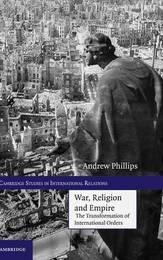
|
War, Religion and Empire: The Transformation of International Orders
Hardback
Main Details
| Title |
War, Religion and Empire: The Transformation of International Orders
|
| Authors and Contributors |
By (author) Andrew Phillips
|
| Series | Cambridge Studies in International Relations |
|---|
| Physical Properties |
| Format:Hardback | | Pages:384 | | Dimensions(mm): Height 229,Width 152 |
|
| ISBN/Barcode |
9780521191289
|
| Classifications | Dewey:327.17 |
|---|
| Audience | | Professional & Vocational | |
|---|
| Illustrations |
5 Tables, black and white
|
|
Publishing Details |
| Publisher |
Cambridge University Press
|
| Imprint |
Cambridge University Press
|
| Publication Date |
23 December 2010 |
| Publication Country |
United Kingdom
|
Description
What are international orders, how are they destroyed, and how can they be defended in the face of violent challenges? Advancing an innovative realist-constructivist account of international order, Andrew Phillips addresses each of these questions in War, Religion and Empire. Phillips argues that international orders rely equally on shared visions of the good and accepted practices of organized violence to cultivate cooperation and manage conflict between political communities. Considering medieval Christendom's collapse and the East Asian Sinosphere's destruction as primary cases, he further argues that international orders are destroyed as a result of legitimation crises punctuated by the disintegration of prevailing social imaginaries, the break-up of empires, and the rise of disruptive military innovations. He concludes by considering contemporary threats to world order, and the responses that must be taken in the coming decades if a broadly liberal international order is to survive.
Author Biography
Andrew Phillips is a Research Fellow in the Department of International Relations at the Australian National University. His research interests focus on the evolution of the global state system and the challenges that new security threats pose to the contemporary world order.
Reviews'This extraordinary conceptual and historical analysis of changes in international orders analyzes the threats that Islamist radicalism and transnational terrorism pose for the present American-centered order through two historical lenses: the collapse of Latin Christendom under the impact of the Reformation and a revolution in war fighting, and the liquidation of the Sinosphere brought about by dynastic decay, millenarian rebellions, and the encroachment of Western imperial expansion. Phillips is theoretically bold and incisive and succeeds in escaping the Western-centric perspective that typifies most contemporary international relations theory. If the second-hands of history, our daily news and pundits, are condemned to tell the wrong time, here is a book for the ages that comes as close to getting things right as is humanly possible. This is a triumph of superior scholarship.' Peter J. Katzenstein, Cornell University 'A rich and novel constructivist analysis of the transformation of international order in both early modern Europe and China. Phillips shows empirically that violence is as much a part of constitutive order as norms.' Henry R. Nau, George Washington University 'War, Religion and Empire is an impressively wide-ranging study that should provoke discussion and debate about the relationship between realism and constructivism, and about how a synthesis of the two can contribute to the historical sociology of international relations. It is a tribute to its breadth that it will challenge many readers to reflect on the conceptual frameworks that can be used to explain the collapse of earlier international orders.' Andrew Linklater, Global Change, Peace and Security 'One of the virtues of the book is that the author gives a primary role to war (realism) and religion (constructivism).' Christopher Coker, International Affairs 'Phillips provides us with an invaluable analytical framework for thinking about the origin, operation, decay and ultimate demise of international orders. War, Religion and Empire is a welcome addition to the constructivist IR literature and we highly recommend it to scholars interested in IR theory, constructivism, comparative historical approaches to IR and the jihadist challenge to the contemporary international order. We also recommend it to faculty teaching undergraduate IR courses.' Andrew A. Latham and Jake Waxman, Cambridge Review of International Affairs
|